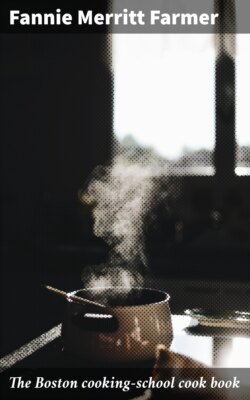Читать книгу The Boston cooking-school cook book - Fannie Merritt Farmer - Страница 39
На сайте Литреса книга снята с продажи.
COFFEE
ОглавлениеTable of Contents
The coffee-tree is native to Abyssinia, but is now grown in all tropical countries. It belongs to the genus Coffea, of which there are about twenty-two species. The seeds of berries of coffee-trees constitute the coffee of commerce. Each berry contains two seeds, with exception of maleberry, which is a single round seed. In their natural state they are almost tasteless; therefore color, shape, and size determine value. Formerly, coffee was cured by exposure to the sun; but on account of warm climate and sudden rainfalls, coffee was often injured. By the new method coffee is washed, and then dried by steam heat.
In coffee plantations, trees are planted in parallel rows, from six to eight feet apart, and are pruned so as never to exceed six feet in height. Banana-trees are often grown in coffee plantations, advantage being taken of their outspreading leaves, which protect coffee-trees from direct rays of the sun. Brazil produces about two-thirds the coffee used. Central America, Java, and Arabia are also coffee centres.
Tea comes to us ready for use; coffee needs roasting. In process of roasting the seeds increase in size, but lose fifteen per cent in weight. Roasting is necessary to develop the delightful aroma and flavor. Java coffee is considered finest. Mocha commands a higher price, owing to certain acidity and sparkle, which alone is not desirable; but when combined with Java, in proportion of two parts Java to one part Mocha, the coffee best suited to average taste is made. Some people prefer Maleberry Java; so especial care is taken to have maleberries separated, that they may be sold for higher price. Old Government Java has deservedly gained a good reputation, as it is carefully inspected, and its sale controlled by Dutch government. Strange as it may seem to the consumer, all coffee sold as Java does not come from the island of Java. Any coffee, wherever grown, having same characteristics and flavor, is sold as Java. The same is true of other kinds of coffee.
The stimulating property of coffee is due to the alkaloid caffeine, together with an essential oil. Like tea, it contains an astringent. Coffee is more stimulating than tea, although, weight for weight, tea contains about twice as much theine as coffee contains caffeine. The smaller proportion of tea used accounts for the difference. A cup of coffee with breakfast, and a cup of tea with supper, serve as a mild stimulant for an adult, and form a valuable food adjunct, but should never be found in the dietary of a child or dyspeptic. Coffee taken in moderation quickens action of the heart, acts directly upon the nervous system, and assists gastric digestion. Fatigue of body and mind are much lessened by moderate use of coffee; severe exposure to cold can be better endured by the coffee drinker. In times of war, coffee has proved more valuable than alcoholic stimulants to keep up the enduring power of soldiers. Coffee acts as an antidote for opium and alcoholic poisoning. Tea and coffee are much more readily absorbed when taken on an empty stomach; therefore this should be avoided except when used for medicinal purposes. Coffee must be taken in moderation; its excessive use means palpitation of the heart, tremor, insomnia, and nervous prostration.
Coffee is often adulterated with chiccory, beans, peas, and various cereals, which are colored, roasted, and ground. By many, a small amount of chiccory is considered an improvement, owing to the bitter principle and volatile oil which it contains. Chiccory is void of caffeine. The addition of chiccory may be detected by adding cold water to supposed coffee; if chiccory is present, the liquid will be quickly discolored, and chiccory will sink; pure coffee will float.
Buying of Coffee. Coffee should be bought for family use in small quantities, freshly roasted and ground; or, if one has a coffee-mill, it may be ground at home as needed. After being ground, unless kept air tight, it quickly deteriorates. If not bought in air-tight cans, with tight-fitting cover, or glass jar, it should be emptied into canister as soon as brought from grocer’s.
Coffee may be served as filtered coffee, infusion of coffee, or decoction of coffee. Commonly speaking, boiled coffee is preferred, and is more economical for the consumer. Coffee is ground fine, coarse, and medium; and the grinding depends on the way in which it is to be made. For filtered coffee have it finely ground; for boiled, coarse or medium.
